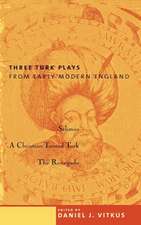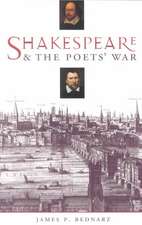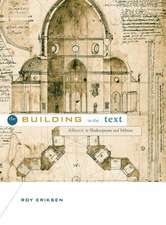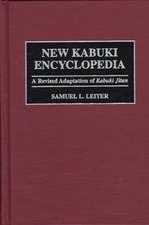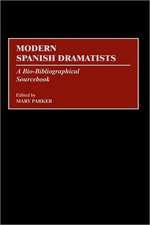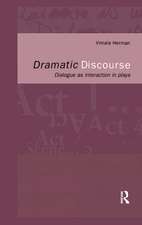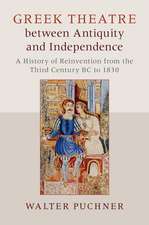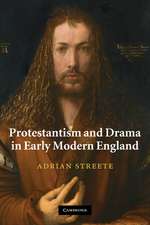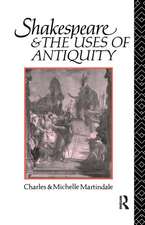Apocalypse and Anti-Catholicism in Seventeenth-Century English Drama
Autor Adrian Streeteen Limba Engleză Hardback – 16 aug 2017
Preț: 695.59 lei
Preț vechi: 781.57 lei
-11% Nou
Puncte Express: 1043
Preț estimativ în valută:
133.12€ • 138.46$ • 109.90£
133.12€ • 138.46$ • 109.90£
Carte disponibilă
Livrare economică 24 martie-07 aprilie
Preluare comenzi: 021 569.72.76
Specificații
ISBN-13: 9781108416146
ISBN-10: 1108416144
Pagini: 298
Ilustrații: 3 b/w illus.
Dimensiuni: 158 x 235 x 20 mm
Greutate: 0.56 kg
Editura: Cambridge University Press
Colecția Cambridge University Press
Locul publicării:Cambridge, United Kingdom
ISBN-10: 1108416144
Pagini: 298
Ilustrații: 3 b/w illus.
Dimensiuni: 158 x 235 x 20 mm
Greutate: 0.56 kg
Editura: Cambridge University Press
Colecția Cambridge University Press
Locul publicării:Cambridge, United Kingdom
Cuprins
Introduction; 1. Anti-Christ and the whore in early modern England – cultures of interpretation; 2. 'What news from Babylon?' Marston's The Dutch Courtesan (1605) and the Spanish peace; 3. 'Mere idolatry'? Resistance and Rome in Middleton's The Lady's Tragedy (1610); 4. 'Occultus Rex': Caroline politics and imperial kingship in Massinger's Believe as You List (1631); 5. 'Purple Pride' – war, episcopacy, and Shirley's The Cardinal (1641); 6. 'Rebellion Orthodox' – arbitrary rule and liberty in Dryden and Lee's The Duke of Guise (1682); Conclusion.
Recenzii
'Its comprehensiveness is staggering: en route to close reading particular plays, Streete provides numerous examples and quotations from a variety of contemporaneous plays, poems, speeches, and sermons, making it the most crossgeneric monograph this reader has seen and enjoyed. Streete's sensitivity and command of early modern culture is unparalleled … Streete's ability to trace ripples of fear through his encyclopaedic grasp of the period's publishing history makes his argument virtually airtight.' Kyle Sebastian Vitale, The Review of English Studies
'A finely detailed and instructive study of how political and religious discourses are reconfigured in the language, plot and personation of drama … an excellent resource that will propel further scholarly interest.' Daniel Cattell, The Seventeenth Century
'… this is a major work of early modern scholarship and it will prove to be invaluable to anyone working in the fields of religious controversy, religio-political drama, the wider religious and political culture of seventeenth-century Britain, or Protestant Britain's relationship with its Protestant and Roman Catholic neighbours and with the cross-denominational application of apocalyptic thought.' Paul Quinn, British Catholic History
'Apocalypse and Anti-Catholicism makes a good companion piece to the same author's earlier study of Protestantism and Drama in Early Modern England (Cambridge, 2009). Streete has carved out a special niche for himself in this field.' R. C. Richardson, Literature & History
'A finely detailed and instructive study of how political and religious discourses are reconfigured in the language, plot and personation of drama … an excellent resource that will propel further scholarly interest.' Daniel Cattell, The Seventeenth Century
'… this is a major work of early modern scholarship and it will prove to be invaluable to anyone working in the fields of religious controversy, religio-political drama, the wider religious and political culture of seventeenth-century Britain, or Protestant Britain's relationship with its Protestant and Roman Catholic neighbours and with the cross-denominational application of apocalyptic thought.' Paul Quinn, British Catholic History
'Apocalypse and Anti-Catholicism makes a good companion piece to the same author's earlier study of Protestantism and Drama in Early Modern England (Cambridge, 2009). Streete has carved out a special niche for himself in this field.' R. C. Richardson, Literature & History
Notă biografică
Descriere
This book studies the varied political uses of apocalyptic and anti-Catholic rhetoric in a wide range of seventeenth-century English drama.


